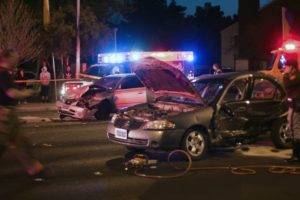California Watson Murder Laws (a.k.a. DUI Murder)
If you drive under the influence (DUI) of alcohol or drugs, you are not only putting yourself and others at risk of serious injury or death, but you are also likely to be charged with also for a number of serious criminal charges. The most serious among these is DUI murder – also known as “Watson murder” – which is a second-degree murder charge.
How You Can Be Convicted of a Murder You Never Intended to Commit
A key element of second-degree murder under California Penal Code 1871is the unlawful killing of another person with “malice aforethought”. This phrase has a very specific meaning in criminal law. An act that is done with malice aforethought is an act that is:
- Intentional;
- Has natural and probable consequences that are dangerous to human life;
- Known by the defendant at the time he or she acted to be dangerous to human life; AND
- Deliberately done with conscious disregard for human life.2
It is important to note that this element does not require that the killing is done intentionally, but rather that the act that causes the death is done intentionally. This means that the prosecution need not prove you intended to kill someone, but rather that you intentionally engaged in a dangerous act that you knew could endanger someone’s life.
In a landmark 1981 case, People v. Watson,3 the California Supreme Court ruled that driving under the influence is an act that meets the qualities of having malice aforethought. Thus, an intoxicated driver who kills another person can be charged with second-degree murder, because he or she knew that it was dangerous, and someone could possibly die from it, but drove under the influence anyway.
Prosecution for DUI Murder
In order for you to be convicted of second-degree murder as a result of driving under the influence, also known as Watson murder, the prosecutor must prove beyond a reasonable doubt all of the following:
- You intentionally drove while under the influence of alcohol or drugs;
- The natural and probable consequences of that driving while under the influence are dangerous to human life; and
- You knowingly acted with conscious disregard for the danger to others.4
The Prior Conviction Advisement

Watson murder is most often charged against those who have prior DUI convictions. The reason for this is that it is that the prosecution has an easier time proving that the driver knew what he or she was doing was dangerous, because all California courts require defendants who are convicted of a DUI offense to sign the following advisement:
“I understand that being under the influence of alcohol or drugs, or both, impairs my ability to safely operate a motor vehicle. Therefore, it is extremely dangerous to human life to drive while under the influence of alcohol or drugs, or both. If I continue to drive while under the influence of alcohol or drugs, or both, and as a result of my driving, someone is killed, I can be charged with murder.”
Signing this statement means that if you are later charged with killing someone while driving under the influence, you have already shown that you were aware that your act has a “natural and probable consequence” that is dangerous to others, and that you consciously disregarded the danger to others.
If you have no prior conviction for DUI, the prosecutor will have a more difficult time proving that you knew your actions were dangerous and you consciously disregarded the danger when you drove under the influence of alcohol or drugs. That is why you are likely to be charged with a lesser related crime if you have no prior conviction.
Related Crimes to Watson Murder
DUI Watson murder is one of three felony-level crimes that involve driving under the influence and the death of another person. These other two are:
- Gross vehicular manslaughter while intoxicated (Penal Code section 191.5(a))
- Vehicular manslaughter while intoxicated (Penal Code section 191.5)
Each of these crimes requires that the driver violate California Vehicle Code 23140, 23152, or 23152 (California’s DUI laws), and that the killing resulted from an unlawful misdemeanor act, or an otherwise legal act that was committed in an unlawful manner. These two crimes are fundamentally the same, except that the first requires “gross negligence,” which means that the person committed the act with an extreme departure from what a reasonably careful person would do in the same situation to prevent harm to others.
Sentencing and Punishment for DUI Murder

The penalties for Watson murder are the same as that of second-degree murder. If you are convicted, you face imprisonment in a state prison for a period of 15 years to life, a maximum fine of $10,000, or both imprisonment and fine.
Watson murder is also a strike on your record under California’s Three Strikes Law, which means that the conviction can be used to enhance the penalty on any other felony conviction you later receive.
Possible Defenses Against Watson Murder Charges
You were not under the influence. If you were not under the influence, the prosecution will not be able to prove you committed an act with malice aforethought. For example, if your BAC level was below the legal limit, you should not be found guilty of this crime. Also, if your blood alcohol content (BAC) level was at or just slightly above the legal limit at the time your BAC level was taken, your attorney may use the “rising BAC” defense. This essentially argues that your BAC level was below the legal limit at the time you were driving, and thus you were not under the influence as defined under California law.
You were not the cause of death. Your attorney can work with an accident reconstruction expert to determine whether the accident can be shown to be the fault of someone else, such as the victim’s own negligence while driving, or the reckless driving of another driver. If your attorney can prove that the accident would have happened even if you were not intoxicated and you were not the cause of the victim’s death, you should not be convicted of this crime.
You were not the driver. The prosecutor, as part of any Watson murder case, will need to show that you actually drove the car when the victim was killed. If you were not the driver, you should not be convicted of this crime. For example, suppose you go to a bar with a group of friends, and because you intend to drink, you give your keys to the designated driver. On the way home, your designated driver crashes your car into a pedestrian who was crossing the street in the dark. All of you exit the vehicle before the police arrive. Not realizing who the driver was, the police arrest you because you are the registered owner of the car.
Frequently Asked Questions
At Wallin & Klarich, we commonly receive questions from those who are facing Watson murder charges. These include:
- What if my previous DUI conviction did not require me to complete a Watson Advisement?
There are a number of people for whom their previous convictions happened before the courts started requiring the signing of the Watson Advisement or requiring that a DUI defendant attend a DUI school as part of his or her probation. If you were not required to do either of these, the prosecutor will find it difficult to prove that you had been previously advised that you had malice aforethought when you drove.
- Can I defend my case by showing I became involuntarily intoxicated?
Yes, California Penal Code 26 protects those who are not aware they have committed a crime. For example, if someone else convinced you that you were drinking non-alcoholic beverages, you were involuntarily intoxicated and could not be shown to have formed the necessary mental state to commit an act with malice aforethought.5
- What if I didn’t intend to drive before I started drinking?
Although you did not intend to drive before you started drinking, it is not a valid defense that your judgement became clouded due to the consumption of alcohol.6
Contact a DUI Attorney If You Have Been Charged with Watson Murder

If you are facing a Watson murder charge as a result of driving under the influence, you do not have to fight these serious charges alone. You have the right to retain the help of an aggressive and experienced criminal defense attorney. At Wallin & Klarich, our attorneys have over 35 years of experience successfully defending people like you who have been accused of Watson murder. We can help you, too. Contact us today so that we can help you overcome this difficult situation.
With offices in Orange County, Riverside, San Bernardino, Victorville, West Covina, Torrance, Los Angeles and San Diego, there is a Wallin & Klarich attorney experienced in California criminal defense available near you, no matter where you work or live.
Call us today at (877) 4-NO-JAIL or (877) 466-5245 for a free phone consultation. We will get through this together.
1. Cal. Pen. § Code 187.↩
2. See CALCRIM 520: First or Second Degree Murder With Malice Aforethought (Pen. Code, § 187).↩
3. People v. Watson (1981) 30 Cal.3d 290.↩
4. See CALCRIM 520, supra, endnote 2.↩
5. See CALCRIM 3425: Unconsciousness: Related Issues. (“Unconsciousness due to involuntary intoxication is a complete defense to a criminal charge under Penal Code section 26, subdivision (4).”)↩
6. See, Pen. Code, § 29.4(b); People v. Martin (2000) 78 Cal.App.4th 1107, 1114–1115.↩
